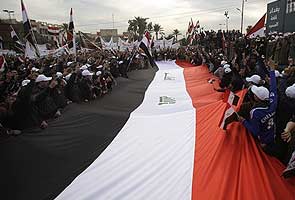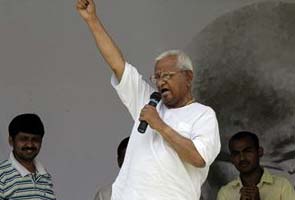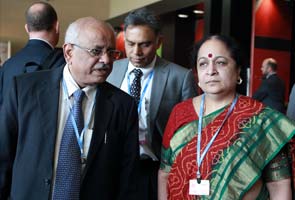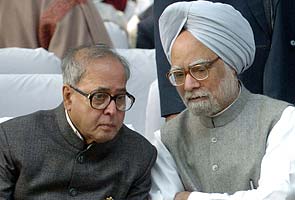31 dec 2011
Baghdad: Hundreds of Sunni Muslims gathered in Baghdad Friday to celebrate the withdrawal of American forces, but in a sign of the sectarian divisions that re-emerged immediately after their departure, Shiite Muslims did not join the event.
The celebration took place near the Abu Hanifa mosque, the main house of worship in the primarily Sunni neighborhood of Azamiyah in northern Baghdad. To secure the event, Iraqi troops blocked traffic on roads leading to the mosque and searched people approaching the area.
During the rally, men and children waved Iraqi flags and raised banners praising those who resisted the U.S. presence in Iraq.
"Baghdad is the castle of resistance," one banner read. "The deeds of the heroes are stronger than the weapons of the occupiers," read another banner. Women threw chocolates to the crowd as a sign of joy.
In his sermon, the mosque's preacher, Sheik Ahmed al-Taha, accused the Americans of stirring up sectarian tension among Iraqis.
"The occupiers created the sectarian conflict as an exit from the quagmire they found themselves in when they were facing 200 military operations against them every day. By dividing Iraqis, the Americans made Iraqis attack each other instead of attacking them," Al Taha told worshippers.
The preacher also called on the government to demand compensation from the Americans for the loss of lives and damage caused during the occupation.
The lingering sectarian divisions Iraq faces was clear during the prayer service and rally, which was almost entirely Sunni. Shiites had been invited to join the celebration but did not show up.
Shiites have even given the departure of the U.S. forces a different name than the Sunnis have. Sunnis generally call it the "evacuation day," whereas Shiites often refer to it as the "fulfillment day" as a way to show that Prime Minister Nouri al-Maliki, who leads a Shiite-dominated government, fulfilled his promise to get all the troops out of the country.
Tensions between Sunnis and Shiites have deepened since al-Maliki's government issued an arrest warrant for the country's top Sunni politician. The government is also trying to push out another member of his government, leaving many Sunnis to question whether they will ever have a place in the Iraqi power structure.
In spite of the problems, some Sunnis were optimistic.
Omar Abdul-Aziz, 28, said the sectarian conflicts Iraq experienced just a few years ago "won't be repeated because Iraqis now understand that sectarianism was planned by the occupiers."
Hundreds of Iraqis cheer departure of US forces
 |
| Dr Sanjay Kumar Cardiac Cardiothoracic Heart Surgeon India |
The celebration took place near the Abu Hanifa mosque, the main house of worship in the primarily Sunni neighborhood of Azamiyah in northern Baghdad. To secure the event, Iraqi troops blocked traffic on roads leading to the mosque and searched people approaching the area.
During the rally, men and children waved Iraqi flags and raised banners praising those who resisted the U.S. presence in Iraq.
"Baghdad is the castle of resistance," one banner read. "The deeds of the heroes are stronger than the weapons of the occupiers," read another banner. Women threw chocolates to the crowd as a sign of joy.
In his sermon, the mosque's preacher, Sheik Ahmed al-Taha, accused the Americans of stirring up sectarian tension among Iraqis.
"The occupiers created the sectarian conflict as an exit from the quagmire they found themselves in when they were facing 200 military operations against them every day. By dividing Iraqis, the Americans made Iraqis attack each other instead of attacking them," Al Taha told worshippers.
The preacher also called on the government to demand compensation from the Americans for the loss of lives and damage caused during the occupation.
The lingering sectarian divisions Iraq faces was clear during the prayer service and rally, which was almost entirely Sunni. Shiites had been invited to join the celebration but did not show up.
Shiites have even given the departure of the U.S. forces a different name than the Sunnis have. Sunnis generally call it the "evacuation day," whereas Shiites often refer to it as the "fulfillment day" as a way to show that Prime Minister Nouri al-Maliki, who leads a Shiite-dominated government, fulfilled his promise to get all the troops out of the country.
Tensions between Sunnis and Shiites have deepened since al-Maliki's government issued an arrest warrant for the country's top Sunni politician. The government is also trying to push out another member of his government, leaving many Sunnis to question whether they will ever have a place in the Iraqi power structure.
In spite of the problems, some Sunnis were optimistic.
Omar Abdul-Aziz, 28, said the sectarian conflicts Iraq experienced just a few years ago "won't be repeated because Iraqis now understand that sectarianism was planned by the occupiers."

















